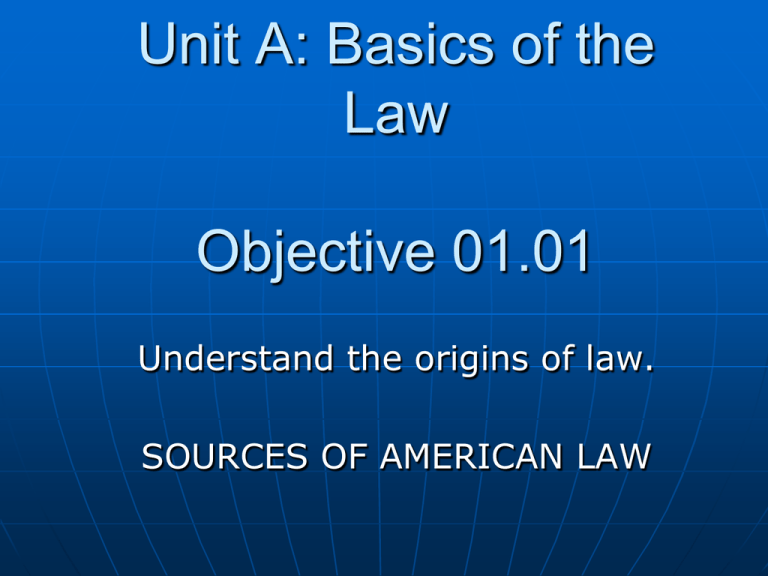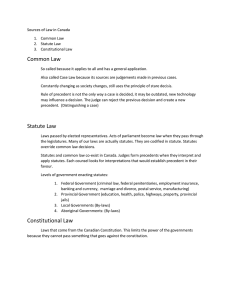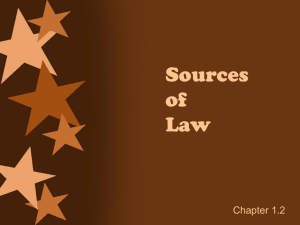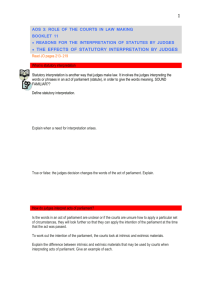Sources of American Law
advertisement

Unit A: Basics of the Law Objective 01.01 Understand the origins of law. SOURCES OF AMERICAN LAW Sources of American Law Common Law Law of Precedent Statutory Law Federal and State Constitutions Administrative Law Common Law Unwritten laws Based on customs and traditions of people in a society English Common Law The King’s court of judges traveled in circuits around the countryside deciding cases. Decisions were based on local customs and traditions. The judges shared decisions with other judges so justice was served equally or “in common.” Common Law Colonists brought English Common Law doctrines with them to America. Primary basis of American legal system Common Law Adopted by US legal system Common law developed into a legal system modeled by nations around the world Law of Precedent Judges referred to decisions in previous common law cases. Judges applied that decision to a new but similar case. Thus, Law of Precedent established. Law of Precedent Also called Case law Also called the Doctrine of stare decisis • Latin for “Let the decision stand” Law of Precedent Evolved from sharing common law Judge researches a similar previous court case. Judge applies that decision to new case. Statutory Law Common law was eventually written down Legislative bodies adopted common laws Common law became statutes. Statutory Law Statutory law is enacted (passed, created, ratified) by a governing body for a specific purpose. • Federal legislature Creates statutes, acts • State legislature Creates statutes • Municipal (city/town) government Creates local ordinances and by-laws Statutes All statutes• Are subject to review by judicial system • Must be constitutional - cannot conflict with the United States Constitution Judicial Review Precedent set by Marbury vs. Madison, 1803, gave court system the right to: • Review Lower Court Decisions • Review Statutory laws • Review Executive Branch Constitutional Law The US Constitution is the supreme law of land. • Any state or local law that conflicts with the US Constitution is unconstitutional. • If unconstitutional, then law is null and void. The Supremacy Clause, US Constitution Article VI Who has supremacy? A higher court prevails over any lower court decisions. A federal law prevails over state laws. State law prevails over municipal (town or city) ordinances. Supreme Court determines questions of constitutionality. Constitutional Law • Balance of powers between the three branches Legislative –Article 1 Executive – Article 2 Judicial – Article 3 • Checks and balances between the branches limits their power. Rights of Citizens US Constitution guarantees rights to citizens • Bill of Rights – Individual rights • Rights of Representation • Arrest/Trial Rights • Suffrage (Voting) Rights • States Rights • Right to amend Constitution Duties of Citizens Duty of Citizens • #1 Allegiance to country Breach of Duty • Treason-disloyalty to country • Expatriation-the act of abandoning one’s country Administrative Law Administrative law is the regulations, orders, rules and decisions of administrative agencies. Legislators create an administrative or regulatory agency. Purpose is to regulate certain activities for the benefit of the public. Administrative (Regulatory) Agencies Have the power to: • Make rules • Enforce rules • Investigate violations • Decide guilt or innocence of violators • Penalize those convicted • Order actions to stop Administrative Agencies Are set up when expert knowledge is needed Have a limited scope of power Are subject to judicial review by the court system Regulatory Agency Example Environmental Protection Agency (EPA) • Established by federal law to help keep our environment clean and healthy for the enjoyment of all citizens • Establishes and enforces rules related to protection of our environment • Can prosecute, fine and issue cease and desist orders against offenders If you disagree, what can you do? Civil Disobedience • Open peaceful protest of a law • Right to protest is guaranteed • First Amendment in Bill of Rights Write your representative Vote when eligible Work to get the law changed









